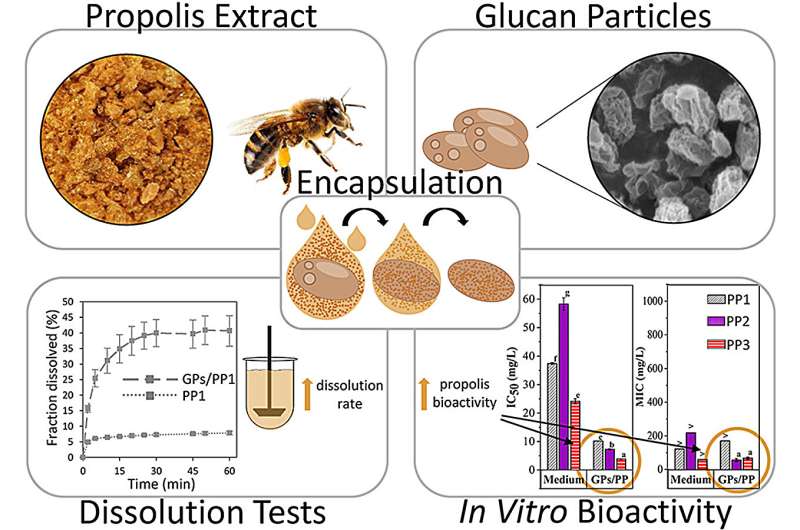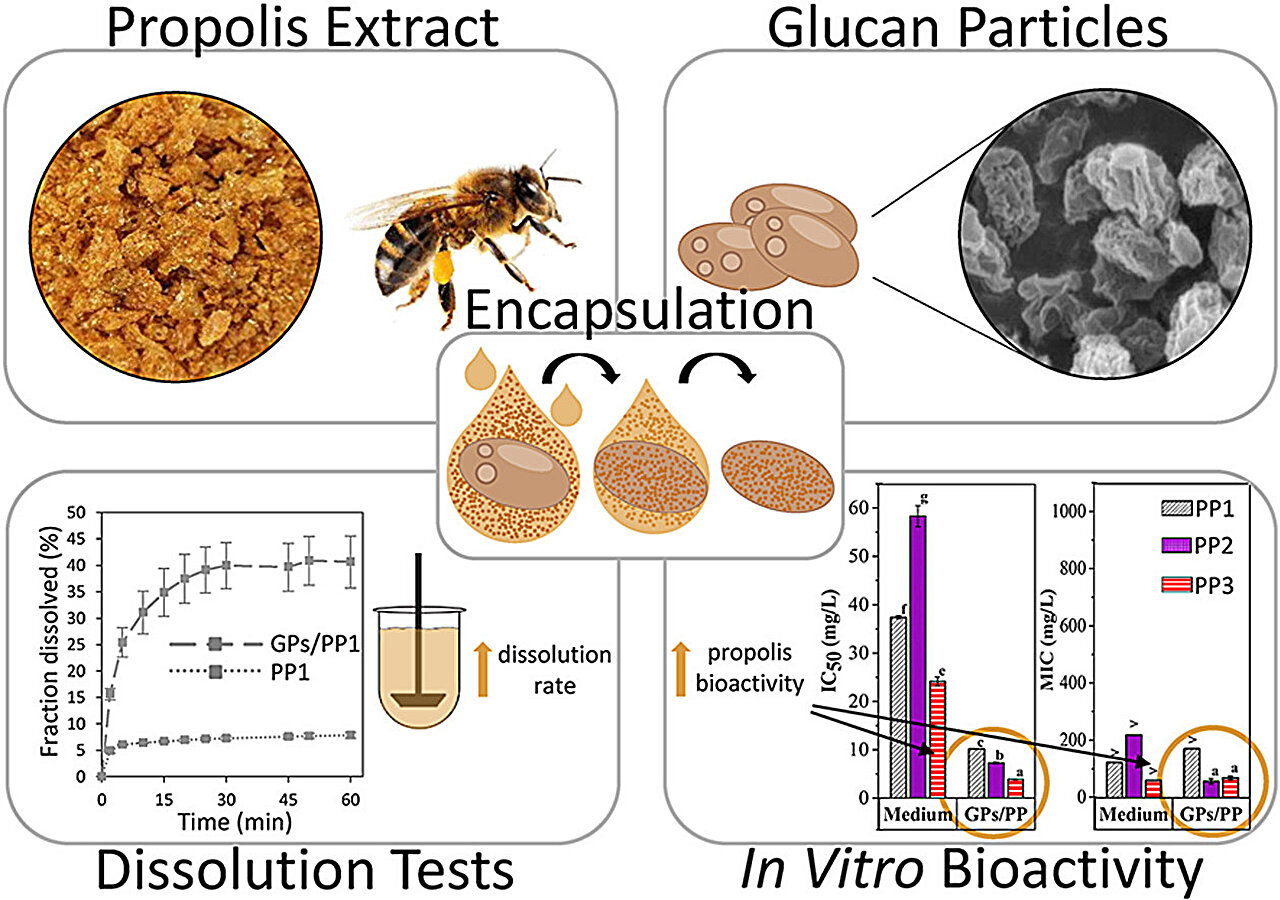
Graphical abstract. Credit: Journal of Drug Delivery Science and Technology (2025). DOI: 10.1016/j.jddst.2025.107490
A team of researchers from the University of Chemistry and Technology in Prague has developed a novel method to enhance the natural healing properties of bee propolis, a potent remedy known for its antibacterial, antioxidant, and anti-inflammatory effects.
By encapsulating propolis extract within porous particles derived from common baker’s yeast, the scientists have successfully overcome propolis’s main limitation—poor water solubility. This new composite material was shown to be significantly more powerful at fighting inflammation and microbes than propolis alone.
The findings, published in the Journal of Drug Delivery Science and Technology, detail research that could lead to a new generation of highly effective, naturally-based therapies.
Propolis is a resinous substance that honeybees produce to protect their hives from diseases. It is a complex mixture of hundreds of beneficial compounds, including flavonoids and phenols, which have well-documented health benefits.
Propolis’s limitations and the new solution
“For centuries, humans have used propolis as a powerful natural medicine,” said Adéla Brejchová and Eva Králová, the lead authors on the study.
“However, its effectiveness has always been limited because it’s waxy and doesn’t dissolve in water, meaning our bodies can’t easily absorb it. Most of its healing potential is locked away,” added Dr. Denisa Lizoňvá, a co-author of the study.
The research team’s innovative solution was to find a natural “carrier” to deliver the propolis. They turned to an inexpensive and safe source: baker’s yeast (Saccharomyces cerevisiae). Through a multi-step process, they extracted the yeast’s tough outer cell wall, creating hollow, porous “glucan particles” (GPs) that act like microscopic sponges.
They then used an advanced spray-drying technique—patented by UCT Prague—to successfully load the propolis extract directly into these particles.
Enhanced bioactivity and wound healing results
The study confirmed that this method was highly efficient, creating a stable, amorphous powder where the propolis was ready to be released. When tested, the new propolis-loaded glucan particles (GPs/PP) far outperformed pure propolis extract.
The GPs/PP composite released propolis rapidly, creating a “supersaturated solution” that delivered a much higher concentration of propolis’s active compounds than pure extract ever could in water.
The encapsulated propolis effectively reduced key inflammatory markers (like NO and IL-6) at levels comparable to propolis dissolved in harsh organic solvents. This demonstrates a significant increase in usable bioactivity.
The new composite showed a vastly improved ability to kill the yeast Candida albicans and the “superbug”-related bacterium Staphylococcus aureus compared to propolis alone.
In a lab model simulating a wound, the GPs/PP 3 composite promoted 100% wound closure within 48 hours. In contrast, propolis extract dissolved in ethanol (the base for many commercial tinctures) failed to fully close the wound even after 72 hours.
Implications for future therapies
Such advanced bioactivity tests were possible thanks to state-of-the-art facilities at the Department of Biochemistry and Microbiology, operated by Prof. Jitka Viktorová who collaborated on the research.
“We’ve essentially created a delivery system that tricks propolis into dissolving in water, making it much more bioactive at lower concentrations,” explained Professor František Štěpánek, a lead researcher on the project.
“The glucan particle itself is also beneficial, as it can interact with the immune system. This combination creates a synergistic effect where the whole is greater than the sum of its parts. By solving the solubility problem, we’ve made propolis a much more effective and viable therapeutic.”
More information:
Adéla Brejchová et al, Evaluation of in vitro bioactivity profile of bee propolis extracts delivered by yeast glucan particles, Journal of Drug Delivery Science and Technology (2025). DOI: 10.1016/j.jddst.2025.107490
Provided by
University of Chemistry and Technology Prague
Citation:
Baker’s yeast carrier makes bee propolis a more potent medicine, study finds (2025, November 13)
retrieved 14 November 2025
from https://phys.org/news/2025-11-baker-yeast-carrier-bee-propolis.html
This document is subject to copyright. Apart from any fair dealing for the purpose of private study or research, no
part may be reproduced without the written permission. The content is provided for information purposes only.
